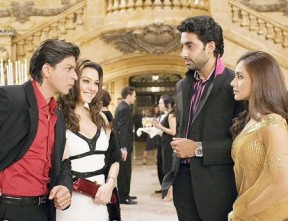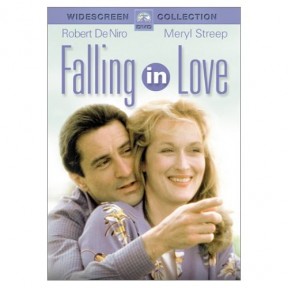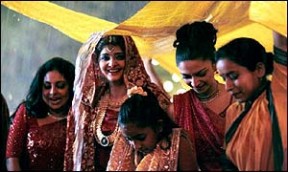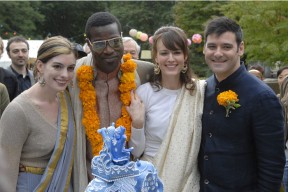When I watched Karan Johar’s Kabhi Alvida Na Kehna sometime in 2006, I wrote a sympathetic review of the film because I felt it was being panned for all the wrong reasons. Yes, the film could have been made more intimately and less lavishly. Amitabh Bachchan could have been more like himself and a little less like the cartoon strip version of Hugh Hefner. The cliches of blondes, broken beds and handcuffs should have been done away with. The film would have worked even without the infantile comedy by the Black Beast and Rani’s awkward whip lashes.
Yes, Shahrukh Khan was too stylised and Rani Mukherjee too detached from the proceedings but compared to many other films made on marital discord in India that cop out and refuse to validate the fact that love is possible even when people are not looking for it, it was a brave film. From upholding, “Its all about loving your parents,” Johar had actually dared to validate love outside of convention. KANK, I thought, was not meant to be a moral film. Just a realistic one, though in retrospect it had been burdened with too much gloss to be taken seriously. Sometime after KANK’s release, I had also interviewed Karan Johar over the phone for a newspaper and complimented him.
Morality has many connotations. For some it means colouring within the lines. For others it means not stealing and not lying. Why someone is falling in or out of love is not my business. But creative dishonesty is something else.
When KANK was released, there were rumours that it was inspired by Closer ( 2006), the controversial Mike Nichols film about two dysfunctional marriages. As it turned out, it wasn’t. A few days back, while surfing channels, I chanced upon a little-known, relatively undersung Meryl Streep, Robert De Niro film called Falling in Love. And something began to unravel. There was the New York subway. Two strangers drawn to each other. Making time to travel together each day in the same tube. Both married to fairly decent people. Both unable to stop the attraction that was threatening to plunge them into an unknown world fraught with dangers. The first stilted date, And another. And the need to consummate. The breaking up of two homes over an affair that was for all practical purposes over. The decisive slap from the wronged wife. KANK in its diluted, elemental, refined form. Just the way I had wanted it to be.
Only this was a film made in 1984 by Ulu Grosbard and Mr Johar had remade it, well, sort of and not even mentioned it to anyone. And no, adding a few songs to the basic story does not make things better. What stood out in comparison was the original’s almost unbearable ordinariness, the humanity of a man and a woman who are not intentionally or habitually hurtful beings but have just been totally thrown out of their comfort zones by the need to see each other, talk and be together. And the actors made the parts so inhabited..so deeply felt and internalised. You can see each doubt, each dilemma, fear, uncertainty and guilt in their awkward body language, their stolen glances, their helplessness. Compare this to KANK where designer totes and heels spoke louder than the characters.
Yes, there is such a thing as genuine inspiration and it is the most natural thing in the world to be inspired by someone’s work and to draw something from it. Take Jonathen Demme’s 2008 film Rachel Getting Married. I have no doubt in my mind that Jenny Lumet, the script writer of the film had Mira Nair’s Monsoon Wedding (2001) at the back of her mind when she wrote the script in seven weeks. There are many similarities. The fret and fever leading upto a wedding. The family mechanics unravelling. A dark secret that threatens to ruin the festivities. The implosions of angst and explosions of repressed anger and the washing away of all pent up emotion in a beautiful ceremony. In Indian clothes, incidentally. There is also music provided by friends of the family and a wedding tent. And yes, there are showers preceding the wedding. Also the texture of realism in the film is very much like Monsoon Wedding’s home video feel. The Connecticut based, upper-middle class family is not much different from the Delhi family gearing up to marry off its beloved daughter.
Yet, it is a film that stands on its own legs because of raw performances by Anne Hathaway who plays Kym, the difficult daughter, Rosemarie DeWitt who plays Rachel, the harried bride-to-be, Debra Winger who plays a mother detached from the complex lives of her daughters and an ensemble cast that rings true. There are hectic family arguments, tears, tantrums, volcanic outbursts and healing to some extent, insider jokes, a shared tragedy, a motley bunch of friends, laughter and celebration. This kind of derivation of an idea that has clicked before cannot be accused of plagiarism. It has its own soul, its own flesh and blood.
And that is not something you can say for a lot of film makers and music directors in India who not just take homegrown classics but also foreign works and filch from them. It is not ours to ask who gives anyone the right to do this to classics. It is important though to respect and acknowledge the source of the inspiration. And to not insult our intelligence too much in an age where just a Google search can reveal who stole from whom and how much.
Reema Moudgil is the author of Perfect Eight (http://www.flipkart.com/b/books/perfect-eight-reema-moudgil-book-9380032870?affid=unboxedwri )
This story was carried in her column in http://tlfmagazine.com/










A few months back while listening to fm radio i came to know that SILSILA was a flop. I cdn’t believe my ears. Hw cd that a movie i enjoyed so much n must hv seen 2-3 time be a flop. Hw cd a movie with songs like “deekha ek khwab” n “rang barse” fame in the time when people used to wait for AB movies be a flop. I think it was too bold for the people of that time or our moralistic society. And Yash Chopra made it ahead of its time. When Karan Johar, a maker of master piece Kal Ho na Ho, was making KANK, he was under immence pressure as his crores of rs.were at stake. Silsila wd be there in back of his mind.And still he dared to move against the stream. So he was not fully himself but trying to present things in such a way as to look justified bofore indian audiance. I think these gaps or feeling of something missing were byproduct of this.
Coming on to morality, i think all these so called ethical concepts n moralities are unnatural n impractical. In the name of morality we are doing so harm to ourselves.All these sex crimes n eve teasing are byproduct of this so called morality. It is this morality that breeds immorality. Look at the innocent girls of our villages n towns who are married off by their parents to a man who is an unknown stranger to them just ‘coz of this moralistic set up of our society. They are totally on their fate, cosider themselves lucky to find a goodone otherwise trapped in a hell. They are so many of them who sleeps with ther husbands not out of love but out of financial arrangements, coz they have nowhere to go. You tell me when a woman (even wife) sleeps with a man (even husband) not out of love but out of financial arrangement, isn’t it immoral ? What do we call them?Most of these molalistic marriges are declaration of his ownership over her for rest of her life.. Isn’t it worst kind of immorality?
But our society don’t see these things ‘coz they are so old n we are so used to them. If disease becomes cronic, it’s better to forget it and carry on.
I think we need more Karan Johars in film industry who cd dare to take up morality issues again n again
I too watched that Meryl Streep movie, and felt as you did.
There are various other examples of this.
I like the last paragraph of this article. Deceptively simple, it has strength, straightforwadness and Ethics in it.
My best guess is, you haven’t seen ‘In mood for love’ – Wong Kar Wai.
Sad to mention the name of the movie- cus KANK could look like a bad C grade scoop in comparison to ‘In Mood for Love’. But I guess KJo has done justice in the best of his intellectual capacity.
‘comparison’ is a dirty word.I think it’s better to say simply it’s a good or a bad movie rather than saying in comparison of…….
Why to say “U are more beautiful” ? Can’t u simply say “U are beautiful” ? Why to bring in “more” ?